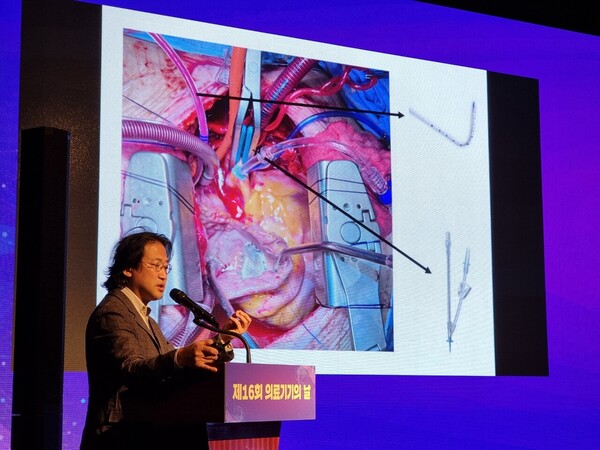“Since the outbreak of the Russia-Ukraine war, the global supply of medical devices has been disrupted. Developing scarce medical devices that can be produced domestically is crucial. The government must provide opportunities for domestic medical equipment makers through post-approval evaluation instead of the approval-first formula.”

Professor Chung Eui-seok, a cardiothoracic surgeon at Kangbuk Samsung Hospital, said so while emphasizing the importance of localizing and expanding the supply of rare and essential medical devices.
He made a presentation with the title of “Medical equipment’s role and its future in the essential healthcare field” at a seminar hosted by the Ministry of Food and Drug Safety on the 16th Medical Device Day at the Westin Chosun in Jung-gu, Seoul, last Friday.
“The ‘orphan devices’ rarely used represent a tiny share of the global medical device market. So, there are no large-scale clinical trials and no evidence base. Companies that manufacture them are also underrepresented because they don’t have the capital,” Professor Chung said.
Chung addressed concerns about the global shortage of medical devices following Russia’s invasion of Ukraine and called for measures to address the shortage of orphan devices.
“For instance, cannulas used in cardiac surgery are not being imported, so old ones are being sanitized and reused, and some hospitals are using urine lines (polycatheters) instead,” he said. “The product is not manufactured in Korea. Although it is easy to make but difficult to obtain a license.”
Chung noted that he understood that the National Institute of Medical Device Safety Information (NIDS) is aware of the problem and is extensively importing replacements for medical devices at risk of supply disruption. The professor then expressed his hope that the workshop would provide an occasion to encourage the manufacture of these simple devices in Korea.
Commenting on the “Patient Customized Medical Device System,” which allows patients to customize their medical devices, Chung said, “I am grateful that the ministry has introduced this system. However, the limit of five cases per company needs to be improved. Countries like Germany, Taiwan, and Australia permit companies to make customized devices independently.”
Nevertheless, Professor Chung evaluated highly that a positive precedent is being made for orphan medical devices in Korea through the ministry's support and the cooperation of medical groups, including the Korean Society for Thoracic and Cardiovascular Surgery.
Chung explained the system's evolution for introducing rare medical devices in Korea. He cited the example of the ministry establishing NIDS under its wing in 2017 following the withdrawal of the U.S. artificial blood vessel manufacturer, Gore, from Korea and simplifying the procedures for importing rare medical devices.
“Rare and essential medical devices need to be introduced to the field through permits rather than licenses and then reevaluated through follow-up monitoring,” he said. “The ministry and NIDS are conducting the “Rare and Urgently Needed Medical Device Introduction Project.”
Chung noted that “E-VITA OPEN NEO,” a hybrid stent graft used in aortic surgery, has been approved for use in Korea with a therapeutic material benefit listing after not being used even once for two years since its development. Consequently, he added that 267 surgeries were performed in Korea alone, the most used in the world, as medical professionals worked together to create the registry.
“We have received invitations from foreign medical institutions to present the results of registry-based research by domestic researchers, and there have also been cases of overseas approvals based on the results,” he said. “Korea has also introduced a system for granting approvals for rare medical devices through real-world evidence (RWE), and our society is researching to establish RWE evidence with the ministry.”
Chung suggested, saying, “One way to do this is to have a mandatory medical device registry and a system for reporting the results, supported by the government.”

